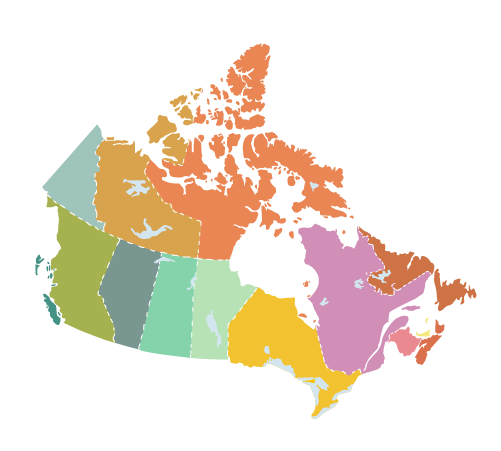Whether you're considering this career or are already on your path to becoming an early childhood educator (ECE) or an early childhood educator assistant (ECEA), this page will guide you through everything you need to know. Explore the sections below to start your journey in early childhood education!
Why work in early childhood education
Top reasons to work in early childhood education
- Job outlook: early childhood educators and assistants are in demand throughout Canada. Over 100,000 new job openings are anticipated between now and 2031Footnote 1
Explore current and future job prospects in your province, territory and region - Choice of job settings: you can work in different environments such as child care centres, daycares, preschools, kindergarten classrooms, home-based child care, child welfare organizations and other settings where early childhood education services are provided
- Dynamic work environment: early childhood education offers an active career in an enriching and stimulating environment. Indoor and outdoor play-based learning allows you to showcase your creativity and can provide you with unforgettable experiences
- A chance to make a difference: with their skills and expertise, early childhood education staff support children and help them to develop their full potential. They not only prepare them for a smoother transition to grade school, but also equip them for the future
Studies shows that 90% of brain development occurs before age five, highlighting the important role played by early childhood educators and assistants in young children's developmentFootnote 2. The quality of education during this period will lay the foundation for lifelong learning.
What do ECEs and ECEAs do
Early childhood educators and assistants work with infants, toddlers, preschoolers, or school-age children. They:
- interact with children, listen to their needs and are attentive to their development
- set up the learning space and choose materials adapted to children's needs, interests and level of development
- discuss with parents about active learning and play for their child to promote their overall development
What's the difference between ECEs and ECEAs
ECEAs
- Provide support: they work alongside ECEs to support children's development through engaging activities and provide guidance, playing a vital role in children's daily learning experiences
- Participate in hands-on activities: they participate in story time, crafts and snack preparation, creating a fun and dynamic environment that encourages children to participate and build self-confidence
- Work as a team: they contribute to team efforts, attend meetings and provide feedback, helping to ensure that each child's needs are met
ECEs
- Strengthen development: they plan, organize and implement enriching programs that promote children's motor skills and physical, cognitive, language, social and emotional development, which has a lasting impact throughout their lives
- Demonstrate creative leadership: they lead engaging activities like storytelling, sport and art, helping children express themselves and discover their interests in a safe and nurturing environment
- Ensure collaboration and provide support: they build strong relationships with families, colleagues and community service leaders, thus ensuring a complete support system that promotes children's development
Learn more about what ECEs and ECEAs do by visiting the Job Bank website.
How can I become an ECE or ECEA
There are different paths to becoming an ECE or ECEA, whether you are starting a new career or transitioning from another field. Requirements vary depending on your province or territory.
Requirements: ECEA
- A high school diploma
- Experience in child care (may be required)
- Completion of an early childhood education assistant certificate program or post-secondary courses in early childhood education (may be required)
- Accreditation by a provincial or territorial association as an early childhood educator (may be required)
Requirements: ECE
- Requirements for training, certification, registration or classification as an early childhood educator vary depending on the province or territory and the early childhood educator level being pursued
- Before enrolling in any courses or programs, first make sure they are recognized or approved for early childhood educator certification by the province or territory where you want to work
- Post-secondary training may include specific courses, a college certificate or a 2 to 4-year program
Check out the certification requirements in your province or territory:

Where can I work
Available jobs
Find available positions in your area:
- search for early childhood education jobs across Canada on the Job Bank website
- select your province or territory to consult available jobs in your region:
Financial supports and tools
Discover funding and tools that can help you build a career in early childhood education:
- financial support: learn about financial support in your province or territory
- student grants and loans: learn about support for students to help pay tuition fees and other expenses
- foreign credential recognition: learn about your occupation and how to get your credentials recognized (candidates are encouraged to review specific requirements for each province and territory)
- taking training while on Employment Insurance (EI): find out if you're eligible to take training while receiving EI benefits
- education planning tools and estimators: plan how you can pay for education and training
- budget planner: use the budget planner to build a personalized plan to help manage your finances
- other supports and tools:
Testimonials

The most rewarding part of this job is being that person that will have an impact on the lives of young children. And being the person that they can lean on throughout the day, whether they need a hug or need help expressing themselves or their feelings or, you know, helping them build that tower just that much taller.

I always joke with everyone and say that this is probably the one job where everyone's so excited when you come in. You get to be friends with your "little coworkers", I always call them, and that's not every profession. And I know this [job has] long days, but it keeps me coming back!

We want to make sure that everybody sees themselves as a part of this child care centre. We know that that's incredibly important for Indigenous people-but for all people-to feel like they're visible in this space. And so, we want to be able to represent the culture of the people whose lands we're on.

Give yourself permission to learn with the children. Watch, listen, and take small steps forward. The real magic happens when you let go of perfection and simply choose to be present.

I was working in an elementary school, and that made me want to get a diploma in this field because children bring me so much joy. So after a few years, I told myself it’s never too late to go back to school.
To me, the French language and the concept of identity are very important. I love reading with the children and explaining French concepts to them because they’re just beginning to learn.
Visit our Stories and Testimonials page for more!